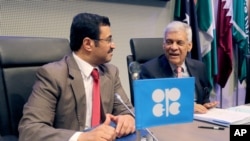Defying OPEC attempts to project unity, Iran and Saudi Arabia went into a meeting of the 12-nation cartel Friday declaring that they would not cede authority to the organization over how much oil they could sell.
Though oil ministers of the Organization of the Petroleum Exporting Countries were expected to keep the official output target of 30 million barrels a day, Iranian and Saudi ministers suggested that overproduction would continue, even if that ended up oversupplying markets and driving down prices.
OPEC has ostensibly maintained the target for the past seven meetings but has been producing more than a million barrels more. Powerhouse Saudi Arabia has accounted for more than a third of that as it tries to maintain market share against non-OPEC competitors.
With prices for benchmark U.S. crude recovering from January lows of about $40 to 60 a barrel, any decline in OPEC output could start being filled by U.S. shale oil producers, who have cut back as prices have fallen but are ready to ramp up their share should they rise.
Prices are already below what most OPEC members need to break even, however, let alone make a profit. And because substantial overproduction by members could drive them down even further, the cartel has been looking to show that it can exercise some control over supply.
OPEC was forced to abolish individual output quotas on members four years ago after they were consistently ignored, and the Saudi and Iranian comments Friday reflected countries' determination to produce what they decide.
“Production policy is a sovereign right,” Saudi Oil Minister Ali Naimi told reporters.
Iranian Petroleum Minister Bijar Namdar Zangeneh advised OPEC to make room for increased output from his country as early as the end of the month. That's the target date for a deal between Tehran and six world powers envisaging an end to sanctions on the Islamic Republic in exchange for curbs on its nuclear program.
Iran hopes to ramp up production by up to one million barrels a day within a year once sanctions are gone, and Zangeneh said his country doesn't “need any decision from the OPEC side to return to the market because it's our right.”
OPEC Oil Ministers Meet, Likely to Maintain Output Targets

VIENNA —



